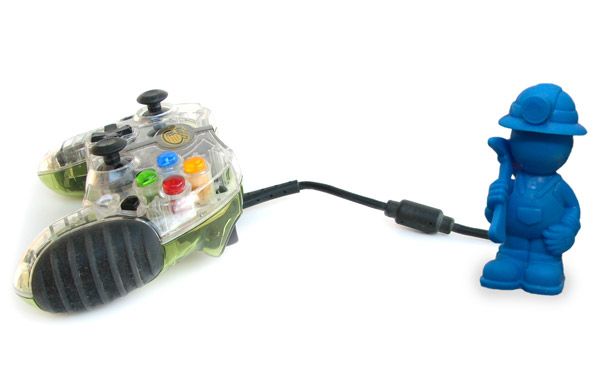Casual Crossover: Learning from the Casual Video Game Industry

It is clear that the casual video game explosion did not simply happen by accident. What can the board game industry learn from the casual video game industry?
When you think of casual video games, you probably think of titles like Angry Birds or FarmVille. But did you realize that Pac-Man is considered to be the first popular casual video game? I remember the first time I discovered a Pac-Man machine in the back room of a local pizzeria. I begged my parents for a quarter, dropped it in the slot, and suddenly my movement of a simple joystick created an intuitive control mechanism within the game that my innocent mind comprehended almost immediately. Other factors like great art design and compelling puzzle-solving gameplay mechanics contributed to Pac-Man’s success, but the simplicity of Pac-Man’s single-joystick control design was the most important factor in its legacy, and this same facet of intuitive control is at the core of casual gaming.
Casual games were really the mainstay of video gaming in the early 1980s, but as video games moved from arcades into homes, game systems created more and more complex controllers to support deeper, more hardcore game experiences. In the 1990s, puzzle games like Tetris found a way to connect with gamers without complex controls, but most games became increasingly complex in both design and control. By 2000, the video game industry had created a mythos steeped in complexity that was nearly inaccessible to the uninitiated.
Something happened that completely reversed this trend midway through the decade. From 2005 to 2010, the casual gaming industry grew from a 300 million dollar worldwide industry to a 3 billion dollar industry. Did this happen by accident? While the industry had the great fortune of being able to leverage new technologies and new gaming platforms, much of the industry’s success can be attributed to game designers and producers that worked hard to target a broader audience.
In 2010, in an interview with EuroGamer.net1, Shigeru Miyamoto, Nintendo’s standard bearer and creator of Donkey Kong, Super Mario, and The Legend of Zelda, stated: “The fact is many people are afraid or scared of gaming technology...so my responsibility here must be to try to let people understand how convenient and useful game technology is and try to remove hurdles so that even your grandpa and grandma are waiting to turn on the power switch of your console easily without hesitation.” From this example and many others, it is clear that the casual video game explosion did not simply happen by accident; leaders in the video game industry have worked hard to not only simplify gaming, but to also make it more accessible.
The following sections explore the success of the casual video game industry and contrast it to the casual board game industry. The goal is to determine if the board game industry can leverage some of the intentional tactics the video game industry has used over the last decade.






Hi!
I agree that boar games (or any industry) can look at something similar as a benchmark and apply it to increase their success. I often hear the board game/video game comparison and I think there are some very valid points.
What I don't often read are some of the critical differences of why these mediums, and what defines them, are difficult to apply to one another.
I think the author listed a few things about video games:
- Quick play time
- Repetitive task
- Easy/intuitive instruction
- Readily accessible technology
- Inexpensive initial purchase cost
Those were some general things that opened up the market to the casual/general audience. And then there were some other comments around the subject (Wii Fitness etc).
I tend to agree that a board game company can look at the computer game market and find out how to mirror that success, but I also saw a ton of logistical/mechanical issues if we try too hard to mimic what the computer game industry has done.
The Differences between the Two:
I think that the reason someone plays a casual video game should be different than the reason they play a casual board game. I think if we try as a market to say: "Play these board games! They are just like your video games!" people would not choose a board game over a video game. And I think that is because a board game cannot compete with a video game in terms of:
1. Quick play time (set up alone on a board game takes a while--not to mention it requires multiple people to play)
2. Repetitive task (this will be hindered because a board game takes a while to play)
3. Expense (a board and components by its very nature will be more costly than an electronic game)
4. Logistical requirements (a board game requires multiple things that a video game does not, mainly, time and other people)
I think we may want to look at, and advertise WHY a board game is DIFFERENT than a casual video game, and why these differences are GOOD.
Let's embrace the fact that a board game wont play like pac man. Let's focus on a different purpose: A board game is meant to bring people together and they will collectively be entertained by the people playing the game, not necessarily (or just) the game itself.
I think this is critical. If we look at a video game-- a person is entertained by the game alone. Multiplayer is an option, but a lot of times, unnecessary and even unwanted in games!
But a board game, the multiplayer component is the very reason TO PLAY. Not the game itself.
I think if we say: Play a casual game because it is different than the games on your phone, because you will have a conversation with your friend you never would have had otherwise. This is our point of difference. This is where we justify that it takes longer to play, that it is not the same as a video game.
If we try and mirror/mimic video games too closely, I think we do what board games are meant to do a disservice. If we make them like video games, they wont be able to compete with a video game, and will always be second best. But if we say, "keep your video games, but play board games because it is a different purpose" then we will have a unique selling point.
I think this is harder to do--saying that a board game is not about YOUR entertainment alone, but it's about other people as well, this runs counter to what we as consumers are used to (everything catering to exactly what we want as an individual--how I feel, regardless of others). But I think we need to celebrate this difference in board gaming. I don't want to see a simple copy of what video games do.
Perhaps I am over-zealous, perhaps I am misguided in this post. But I just thought of that as I was reading this article.
TL;DR
Video games are great in their unique way, board games are great in their unique way. Let's not try to make board games a mere copy of what video games are doing; let's highlight their differences, and why each has a reason to be.
Great comments, thanks Sean! You seem knowledgable and passionate about this topic...we'd love to have you on board as an author at some point. Email us at editor@casualgamerevolution.com if you'd like to be involved with future articles about this or similar topics.